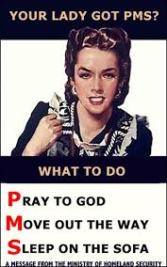Waking up every month with a cranky, depressed mood for nothing in particular. Premenstrual syndrome (PMS) is a collection of emotional symptoms with or without physical symptoms related to a women’s menstrual cycle. The specific emotional symptoms vary from woman to woman. There are variety of symptoms but the three most common ones are irritability, tension and dysphoria (unhappiness). Other emotional and non specific symptoms include insomnia, stress, anxiety, headache, fatigue, mood swings, increased emotional sensitivity and changes in libido (sex drive).
Women also experience physical symptoms like bloating, abdominal cramps, constipation, tenderness of breasts, cyclic acne and muscle pain. No matter how disruptive the pain is it cannot be considered PMS until and unless it is associated with emotional symptoms. These symptoms are not necessarily to change in every cycle. Sometimes these symptoms don’t take part at all and many a times all of them take part.
Under typical definitions these symptoms usually occur within 10 days period prior to menses and must not be present for at least 1 week between the onset of menses and ovulation. Getting uncomfortable with these symptoms is not going to help you in any way. It affects your normal routine and the people around you.” Indulging in comfort foods like gooey chocolate, bars, gulping down coffee/tea, skipping meals because of feeling bloated is certainly not going to help.” Says Dr. Loveleena Nadir, Sr. Consultant Obstetrician and Gynecologist, Fortis La Femme.
Risk factors:
– High caffeine intake
– Stress may precipitate condition
– Increasing age
– History of depression
– Family history
Top 5 cures for PMS:
- Magnesium: It is a great element of choice to be added during these symptoms as it contains serotonin. Serotonin which in simple terms mean a mood balancer of the brain. It is a brain chemical which plays role in mood fluctuation and sensitivity. Magnesium reduces bloating and breast tenderness.
Foods rich in magnesium: Brown rice, lentils, whole grain bread, spinach, beans, cashews
- Vitamin B: cure your crankiness and satisfy your food cravings by increasing vitamin B supplement.
Foods rich in Vitamin B: Stay happy by munching a handful of nuts, bananas, chicken breast, sweet potato, whole grains and beans
- Healthy fat> unhealthy fat: Try cutting down on unhealthy fat atleast 2 weeks prior to your menses.
Foods rich in healthy fat: Pumpkin seeds, salmon, walnuts, tuna
- Potassium: A must for mood swings
Foods rich in potassium: Fresh fruit salads including oranges and apples.
- Increase your fluid/ water intake: Water is drained out of body in the way of sweat and urine hence it’s important to drink water at this time more than the usual quantity. Alternatively you can switch over lemonade or coconut water for more potassium.
ADVICE:
- Avoid skipping meals during periods
- Avoid taking medications like pain killers instead go for the above nutrients to be included in your diet.
DO MEN GET PMS??
Yes, it is real just that in males it is known with a different name. It’s called as irritable male syndrome (IMS). Dr Aimee Aube luck of the University of Derby, who carried out the study, said: “We asked 50 men and 50 women lots of questions about symptoms normally associated with PMS and we found men actually scored higher than women in everything apart from water retention.” The men admitted to feeling antisocial, irritable, suffering poor concentration, and depression, lack of arousal, hot flushes, headache, and back pain. The researchers feel the pain threshold is different for males and females but just that females don’t give it much of an attention.
- It is a topic of discussion as some believe that men do get PMS and some believe they don’t. PMS basically occurs in females due to imbalance of female hormones prior to 1 or 2 weeks of their menses. But these hormonal imbalances don’t take in males at an early age but it does take place at a old age as ageing leads to decrease in testosterone level.
- Males experience mood swings and irritability due to the poor diet which is full of refined sugar and unhealthy fats, too much alcohol and caffeine, and not enough fiber, minerals and vitamins. This is similarly seen in females as well.
- Some other factors which affect men’s moods are social stresses including work and financial pressures and the emotional suppression.
As with the strong evidence above I feel men do suffer from IMS though it’s not proved but researchers have done their part and made it evident that men do suffer from mood swings in a larger way.
WHAT CAN A GUY DO ABOUT IRRITIBILITY AND MOOD SWINGS??
– Blood sugar balance food plan
– Regular exercise
– Plenty of fruits and vegetables
– Proper micronutrients
– Healthy emotional balance
